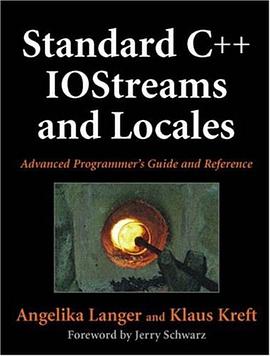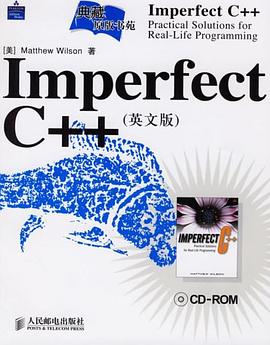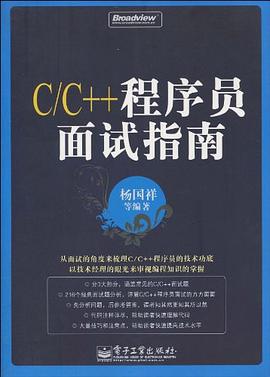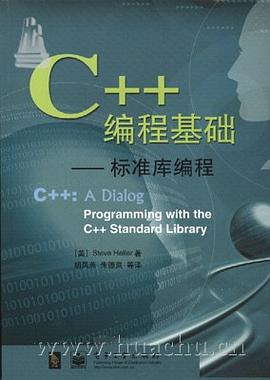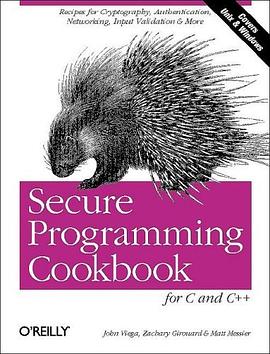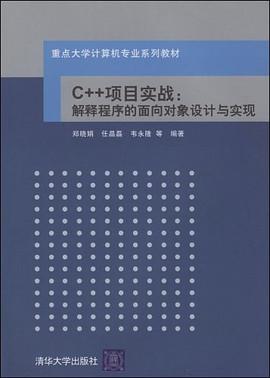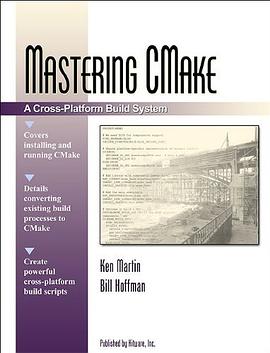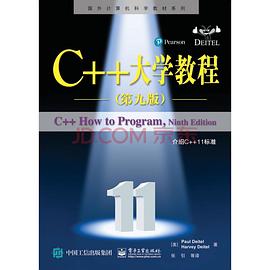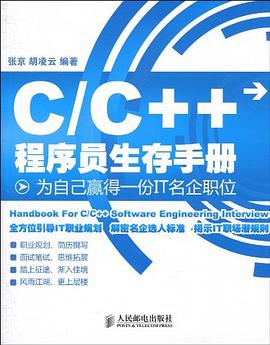

具體描述
在本書中,兩位知名的C++專傢將全球C++團體的集體智慧和經驗凝結成一套編程規範。這些規範可以作為每一個開發團隊製定實際開發規範的基礎,更是每一位C++程序員應該遵循的行事準則。書中對每一條規範都給齣瞭精確的描述,並輔以實例說明;從類型定義到差錯處理,都給齣瞭最佳的C++實踐。即使使用C++多年的程序員也會從中受益匪淺。
本書適閤於各層次C++程序員,也可作為高等院校C++課程的教學參考書。
著者簡介
Herb Sutter,ISO C++標準委員會主席,C++ Users Journal雜誌特邀編輯和專欄作傢;他目前在微軟公司領導NET環境下C++浯言擴展的設計工作除本書外.他還撰寫瞭三本廣受贊譽的圖書:Exceptional C++ Style、Exceptional C++和More Exceptional C++。 .
Andrei Alexandrescu,世界頂級的C++專傢.“C++ Users Journal雜誌的專欄作傢,他的Modem C++ Design—書曾榮獲2001年最佳C++圖朽稱號.書中所開發的Loki已經成為最負盛名的C++程序庫之一。
圖書目錄
0. Don't sweat the small stuff. (Or: Know what not to standardize.) 2
1. Compile cleanly at high warning levels. 4
2. Use an automated build system. 7
3. Use a version control system. 8
4. Invest in code reviews. 9
Design Style 11
5. Give one entity one cohesive responsibility. 12
6. Correctness, simplicity, and clarity come first. 13
7. Know when and how to code for scalability. 14
8. Don't optimize prematurely. 16
9. Don't pessimize prematurely. 18
10. Minimize global and shared data. 19
11. Hide information. 20
12. Know when and how to code for concurrency. 21
13. Ensure resources are owned by objects. Use explicit RAII and smart pointers. 24
Coding Style 27
14. Prefer compile- and link-time errors to run-time errors. 28
15. Use const proactively. 30
16. Avoid macros. 32
17. Avoid magic numbers. 34
18. Declare variables as locally as possible. 35
19. Always initialize variables. 36
20. Avoid long functions. Avoid deep nesting. 38
21. Avoid initialization dependencies across compilation units. 39
22. Minimize definitional dependencies. Avoid cyclic dependencies. 40
23. Make header files self-sufficient. 42
24. Always write internal #include guards. Never write external #include guards. 43
Functions and Operators 45
25. Take parameters appropriately by value, (smart) pointer, or reference. 46
26. Preserve natural semantics for overloaded operators. 47
27. Prefer the canonical forms of arithmetic and assignment operators. 48
28. Prefer the canonical form of + + and --. Prefer calling the prefix forms. 50
29. Consider overloading to avoid implicit type conversions. 51
30. Avoid overloading &&, ¢ò, or, (comma). 52
31. Don't write code that depends on the order of evaluation of function arguments. 54
Class Design and Inheritance 55
32. Be clear what kind of class you' re writing. 56
33. Prefer minimal classes to monolithic classes. 57
34. Prefer composition to inheritance. 58
35. Avoid inheriting from classes that were not designed to be base classes. 60
36. Prefer providing abstract interfaces. 62
37. Public inheritance is substitutability. Inherit, not to reuse, but to be reused 64
38. Practice safe overriding. 66
39. Consider making virtual functions nonpublic, and public functions nonvirtual. 68
40. Avoid providing implicit conversions. 70
41. Make data members private, except in behaviorless aggregates (C-style structs). 72
42. Don't give away your internals. 74
43. Pimpl judiciously. 76
44. Prefer writing nonmember nonfriend functions. 79
45. Always provide new and delete together. 80
46. If you provide any class-specific new, provide all of the standard forms (plain, in-place, and nothrow). 82
Construction, Destruction, and Copying 85
47. Define and initialize member variables in the same order. 86
48. Prefer initialization to assignment in constructors. 87
49. Avoid calling virtual functions in constructors and destructors. 88
50. Make base class destructors public and virtual, or protected and nonvirtual. 90
51. Destructors, deallocation, and swap never fail. 92
52. Copy and destroy consistently. 93
53. Explicitly enable or disable copying. 95
54. Avoid slicing. Consider Clone instead of copying in base classes. 96
55. Prefer the canonical form of assignment. 99
56. Whenever it makes sense, provide a no-fail swap (and provide it correctly). 100
Namespaces and Modules 103
57. Keep a type and its nonmember function interface in the same namespace. 104
58. Keep types and functions in separate namespaces unless they're specifically intended to work together. 106
59. Don't write namespace usings in a header file or before an #include. 108
60. Avoid allocating and deallocating memory in different modules. 111
61. Don't define entities with linkage in a header file. 112
62. Don't allow exceptions to propagate across module boundaries. 114
63. Use sufficiently portable types in a module's interface. 116
Templates and Genericity 119
64. Blend static and dynamic polymorphism judiciously. 120
65. Customize intentionally and explicitly. 122
66. Don't specialize function templates. 126
67. Don't write unintentionally nongeneric code. 128
Error Handling and Exceptions 129
68. Assert liberally to document internal assumptions and invariants. 130
69. Establish a rational error handling policy, and follow it strictly. 132
70. Distinguish between errors and non-errors. 134
71. Design and write error-safe code. 137
72. Prefer to use exceptions to report errors. 140
73. Throw by value, catch by reference. 144
74. Report, handle, and translate errors appropriately. 145
75. Avoid exception specifications. 146
STL: containers 149
76. Use vector by default. Otherwise, choose an appropriate container. 150
77. Use vector and string instead of arrays. 152
78. Use vector (and string::c_str) to exchange data with non-C++ APIs. 153
79. Store only values and smart pointers in containers. 154
80. Prefer pushback to other ways of expanding a sequence. 155
81. Prefer range operations to single-element operations. 156
82. Use the accepted idioms to really shrink capacity and really erase elements. 157
STL: Algorithms 159
83. Use a checked STL implementation. 160
84. Prefer algorithm calls to handwritten loops. 162
85. Use the right STL search algorithm. 165
86. Use the right STL sort algorithm. 166
87. Make predicates pure functions. 68
88. Prefer function objects over functions as algorithm and comparer arguments. 170
89. Write function objects correctly. 172
Type Safety 173
90. Avoid type switching; prefer polymorphism. 174
91. Rely on types, not on representations. 176
92. Avoid using reinterpret_cast. 177
93. Avoid using static_cast on pointers. 178
94. Avoid casting away const. 179
95. Don't use C-style casts. 180
96. Don't memcpy or memcmp non-PODs. 182
97. Don't use unions to reinterpret representation. 183
98. Don't use varargs (ellipsis). 184
99. Don't use invalid objects. Don't use unsafe functions. 185
100. Don't treat arrays polymorphically. 186
Bibliography 187
Summary of Summaries 195
Index 209
· · · · · · (收起)
讀後感
名字起的很有吸引力,其实内容很多章节讲的东西,都是<<effective c++>>里面的,我不知道原版书的文采怎么样?所以我不好妄加评论,但这本中文版的译者的翻译水平,我真的不敢苟同,翻译的僵硬,晦涩,缺乏灵活性,估计就是逐字翻译的,唉,浪费了我几十块钱,买了一本多余的书!
評分其实我想看个实践,别人的方法。 副标题叫Best Practices,但是Practice很少。 这本书的内容都缺少实践,站着说话不腰疼,对于我这样的菜鸟感觉是这样的。 比如这条,比如有个巨类: CHugeClass { function0(); function1(); function2(); function3(); .... f...
評分我看过了 我看过了 我看过了 我看过了 我看过了 我看过了 我看过了 我看过了 我看过了 我看过了 我看过了 我看过了 我看过了 我看过了 我看过了 我看过了 我看过了 我看过了 我看过了 我看过了 我看过了 我看过了 我看过了 我看过了 我看过了 我看过了 我看过了 我看过了 我看...
評分我看过了 我看过了 我看过了 我看过了 我看过了 我看过了 我看过了 我看过了 我看过了 我看过了 我看过了 我看过了 我看过了 我看过了 我看过了 我看过了 我看过了 我看过了 我看过了 我看过了 我看过了 我看过了 我看过了 我看过了 我看过了 我看过了 我看过了 我看过了 我看...
評分其实这本书很鸡肋。因为此书是对一条条的规范、原则、实践等的高度提炼,能力到了自然能理解,能力没到看完也不一定能理解,此时你需要类似《Unix编程艺术》的书,当然你仍然需要足够的实践来支持,要不就会像我一样在这里说大话! 如果你是完美主义者,如果你本来就注重思维...
用戶評價
技巧比較實用
评分技巧比較實用
评分技巧比較實用
评分技巧比較實用
评分現代c++程序員必讀。
相關圖書
本站所有內容均為互聯網搜索引擎提供的公開搜索信息,本站不存儲任何數據與內容,任何內容與數據均與本站無關,如有需要請聯繫相關搜索引擎包括但不限於百度,google,bing,sogou 等
© 2025 book.quotespace.org All Rights Reserved. 小美書屋 版权所有

